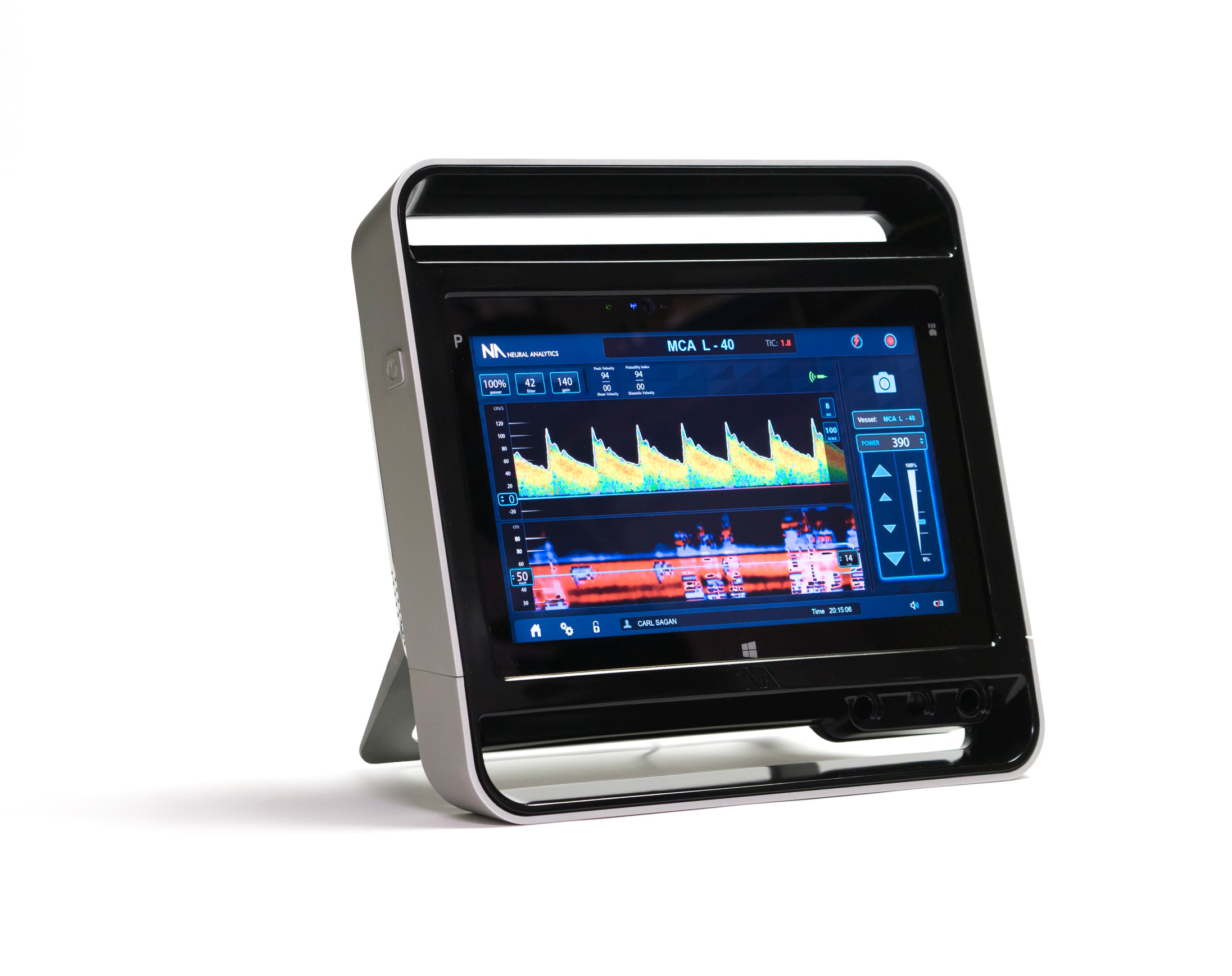Neural Analytics Inc. has announced the commercial launch of its Lucid M1 Transcranial Doppler Ultrasound System, a portable brain monitoring system designed to measure cerebral blood flow velocities within the head and neck. It is the first FDA cleared fully portable all-in-one ultrasound system designed for rapid triaging and monitoring of patients with brain disorders. The device’s accuracy, portability, and affordability have the potential to make it a powerful frontline tool for rapid diagnosis of stroke and other brain disorders where minutes can mean the difference between life and death.

Image countesy of Neural Analytics
The Lucid System is a battery operated medical grade tablet device designed to be moved easily throughout a medical facility in a range of settings that require the rapid assessment of blood flow in the brain to expedite treatment. Probing with signals in the 1MHz region, the system’s single-element transceiver uses Doppler imaging to locate and trace blood flow within the brain’s major vasculature network, and quickly locate blockages, hemorrhages, and embolisms. This analysis is non-invasive, can be performed in the physician’s office, emergency room, or even in the field. Many significant brain disorders, such as severe traumatic brain injury (TBI), are caused by blood flow disruption.
“The Lucid System offers the ability to accurately measure the flow of blood in the brain, which is critical to assess and monitor patients suspected of severe brain conditions,” said Neil Martin, Chief Medical Officer of Neural Analytics, and Chief of Neurosurgery at the University of California Los Angeles. “Thanks to the portability of the product, for the first time, clinicians will be able to bring this level of care directly to the patient prior to the need for more complex and invasive tests.”
Rapid diagnosis and treatment of strokes and other circulatory disorders could have a dramatic effect on patient survival and recovery rates of the more than 30 million people who suffer from severe blood flow disorders each year throughout the world. TBI and stroke contribute the most to the global disease burden for these disorders. There are 2.5 million people affected by TBI each year in the United States, with 14.8 million people affected globally.
The cost of TBI care in the U.S. alone totals $77 billion annually and, reliable triage and timely treatment remains unavailable for a vast majority of these patients. Stroke affects about 16 million people and kill an estimated 5.7 million, with an annual U.S. healthcare cost of $104 billion.
Partnering for Improved Stroke Care
The company also said that it has joined the Society of Vascular and Interventional Neurology (SVIN) to support Mission 2020, an initiative to enhance global efforts to improve stroke care worldwide by significantly increasing stroke treatments for eligible patients and reducing global stroke disability. The initiative was unveiled at the SVIN 9th Annual Meeting and 4th Annual Stroke Center Workshop, taking place from November 16-19, 2016 in Brooklyn, New York.
“Over the last several years, the field of interventional neurology has witnessed an innovation explosion that has fundamentally changed the way that we treat stroke to improve patient outcomes. SVIN has set an ambitious goal to treat every eligible stroke patient emergently with mechanical thrombectomy, but this can only be achieved if stroke patients get access to hospitals with mechanical thrombectomy capability within six hours of their symptoms,” said Dr. Dileep Yavagal, MD, Past President of SVIN. “We are gratified that Neural Analytics will support SVIN on this important initiative as their future technologies will assist us in determining if a patient is suffering from a brain blood flow disorder like stroke, potentially leading to faster treatment and better overall outcomes for these patients.”
SVIN will partner with several governmental and industry collaborators to achieve their initiative by focusing on efforts to improve public awareness for stroke symptoms, supporting legislation to encourage rapid triage of stroke patients, establishing financial initiatives to improve access to care for countries without health insurance and encouraging the development of new technologies to improve stroke assessment and treatment. One supporter announced at the meeting was Neural Analytics which demonstrated its Lucid™ System, a device designed to help improve rapid assessment of patients with brain blood flow disorders at the meeting.
“We are pleased to support SVIN on this important initiative to improve stroke treatment worldwide and help reduce the disability associated with this condition,” said Robert Hamilton, Co-Founder & Chief Science Officer of Neural Analytics. “A critical component for effective stroke treatment is determining an accurate diagnosis as quickly as possible in settings inside and outside the hospital. Neural Analytics is developing new and improved portable tools to help expedite the determination and treatment of patients suffering from these brain diseases.”




